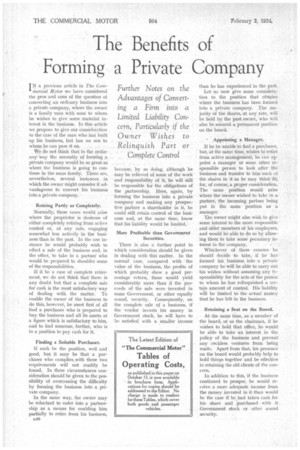The Benefits of Forming a Private Company
Page 54

If you've noticed an error in this article please click here to report it so we can fix it.
Further Notes on the Advantages of Converting a Firm into a Limited Liability Concern, Particularly if the Owner. Wishes to Relinquish Part or.
Complete Control
I N. a previous article in The CUM'. )nercial. Motor we have considered the pros and cons of the question of converting an ordinary business into a private company, where the owner is a family man with sons to whom he wishes to give some material interest in the business. In this article we propose to give our consideration to the case of the man who has built up his business, but has no son to whom he can pass it on. .
We clo -not think that in the ordia-. any *ay the necessity of forming .a private company would be so great as where the business is going to continue in the same family, There are, nevertheless, several instances in which the owner might consider it advantageous to convert his business into a private company.
Retiring Partly or Completely.
Normally, these cases would arise where the proprietor is desirous of either completely retiring from active control or, at any rate, engaging somewhat less actively in the business than in the past. in the one instance he would probably wish to effect a sale of the business and, in the other, to take in a partnerwho would be prepared to shoulder some of the responsibilities.
If it be a case of complete retirement, we do not think that thereis any doubt bat that a complete sale for cash is the most satisfactory way of dealing with the matter. To enable the owner of the business to do this, however, he must first of all find a purchaser who is prepared to buy the business and all its assets at a figure which is satisfactory to him, and to find someone, further, who is in a position to pay cash for it.
Finding a Suitable Purchaser.
If such be the position, well and good, but it may be that a purchaser who complies, with these two requirements will not readily be found. In these circumstances consideration should be given to the possibility of overcoming the difficulty by forming the business into a private company.
In the same way, the owner may be reluctant to enter into a partnership as a means for enabling him partially to retire from his business, e40
because, by so doing, although he may be relieved of some of the work and responsibility of it, he Will still be responsible for the obligations of the partnership. Here, again, by -forming the business into a private company and making any prospective partner a shareholder in it, he could still retain control of the business and, at the same time, know that his liability would be limited.
More Profitable than Government Securities.
There is also a further point to which consideration should be given in dealing with this matter. In the normal case, • compared with • the value of the business, the profits of which probably show a good percentage return, these would yield considerably more than if the proceeds of the sale were invested in some Government, or other equally sound, security_ Consequently, on the complete sale of a business, if the vendor invests his money in Government stock, he will have to be satisfied with a smaller income
than he has experienced in the past.
Let us now give some consideration to the position that obtains where the business has been formed into a private Company. The majority of the shares, at any rate, will be held by the past owner, who will also be assured a permanent position on the board.
• Appointing a Manager.
If he be unable to find a purchaser, but, at the same time, wishes to retire from active management, he can ap-. point a manager or some other. responsible person to look after the business and transfer to him such of the shares in it as he may think fit, for, of course, a proper consideration. The same . position would arise. where the owner wished to take in a partner, the incoming partner being put in the same position as a manager.
The owner might also wish to give some interest to the more responsible • and older members of his employees, and would be able to do so by allowing them to take seine pecuniary interest in the company.
Whichever of these courses he should decide to take, if he hasformed his business. into • a private company he will be able to carry out his wishes without assuming any ecsponsibility for the acts of the person to whom he has relinquished a certaM amount of control. His liability will be limited to the actual money that he has left in the business_ Retaining a Seat on the Board.
At the same time, as a member of the board, or as the chairman, if he wishes to hold that office, he would be able to take an interest in the policy of the business and prevent any reckless ventures from being made. Apart from that, his presence on the board would probably help to hold things together and be effective in retaining the old clients of the concern.
In addition to this, if the business continued to prosper, he would receive a more adequate income from the money invested in it than would be the case if he had taken cash for his share and purchased with it Government stock or other round security.




























































































